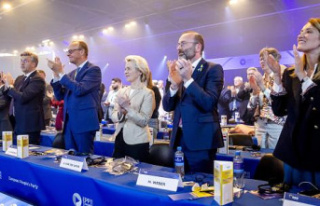Cincinnatus was a Roman consul in the 5th Century BC. He had used his political withdrawal for his cultivation of his lands. Nicolas Sarkozy appears to be taking advantage of this to cultivate his own lands. The former President of France has been a bestseller author ever since he left the Elysee. He is also today the new pythia for Arts and Letters. This is the one we turn to when we want to see the future of literature amid the chaos of modern capitalism. Nicolas Sarkozy's "cultural” interviews - featuring photos of the aforementioned with a book in their hands or in front a library to give more weight to his shock words - are now regular appointments. Some would call it a chestnut tree.
The former head of state gave his latest oracles to the professional magazine Livres Hebdo. Nicolas Sarkozy is an expert on reading, school programs and literary re-entry. It's not Rima Abdul Malak who was just appointed rue de Valois. The journalists at "Livres Hebdo", however, address the "compulsive" reader. Sarkozy provides a list of eclectic books that will help you choose what to read for holidays. It includes both Chaim Potok as well as Helene Carrere D'Encausse. The husband of Carla Bruni, despite all the arrogance and snide criticisms, has a modest solution. When he speaks about Marguerite Duras, he is:
Nicolas Sarkozy is not a specialist when he speaks and writes about art (Promenades, Herscher, 2021). Humility, again:
The enlightened opinion expressed by the reader, who "suffered much on" "the Princess Of Cleves - no doubt due to excessive identification with Duke of Nemours- is not the only thing that interests "Weekly Books": it is also the vision of Lagardere the parent company of Hachette Book. Nicolas Sarkozy was indeed a member of the board of directors for the group led by Arnaud Legardere, one year ago.
He has made contacts with several publishers in the Hachette group through this role. Sophie de Closets was the former boss at Fayard (house owned by Hachette). After learning from "Le Canard enchaine" that Jerome Lavrilleux was his former campaign manager, the investigation by Gerard Davet, Fabrice Lhomme and "La Haine" revealed that he had fueled both investigations by Fabrice Lhomme and Fabrice Lhomme. The Sarko Years and the Apocalypse. Fayard also published The Fillon Years. Nicolas Sarkozy was allegedly made to call Sophie de Closets in a plot against himself, according to "le Monde", March.
Today, he told "LivresHebdo" that he had never met Sophie de Closets and that if he did, it would not be as an administrator, but as a victim of a frame up. His tense disputes with Olivier Nora (head of Grasset), another Hachette house, he says it is "controversy without foundations" and "unuseful gossip". He doesn't have the enthusiasm to express all the positive things he thinks about the merger between Editis and Lagardere, which is a massive deal that still raises many concerns in the world of books. What is the future of small houses? What protections are available for authors? What are the effects of editorial diversity?
Nicolas Sarkozy sees nothing but positive in this hyper-concentration.
It's not clear that Canal employees, another group purchased by Bollore, where punitive dismissals were successful, think the exact same thing. It's likely that it's the poet license of Sarkozy who is expressed there. He is able to suggest completely crazy and even revolutionary ideas, like moving the literary season forward from September to June. A second way is to imagine yourself as the master of clocks.












